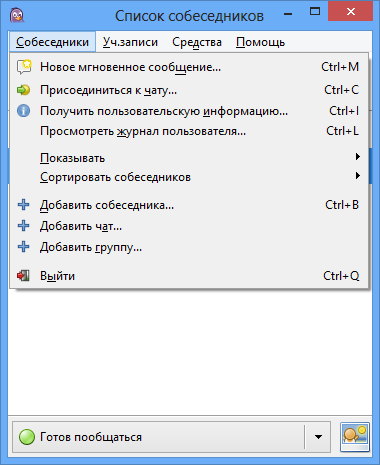
I have tested file transfers via Skype >Pidgin, Pidgin >Skype, and Pidgin >Pidgin. In all cases the file transfers fail. File transfers Skype >Skype succeed. Neither user is connected through a proxy or any network tomfoolery. Skype >Pidgin: Pidgin reports: The user sent files in an unsupported way. Adium File Transfer Problems. I have Adium 1.0.6 and each time I try to send my friend a file through Adium it keeps saying that the transfer failed. Adium/gaim/Pidgin has always ben notoiously unreliable for sending files, especially to people that aren't also using Adium/gaim/Pidgin.
This script is intended to help automate account setups for Openfire (XMPP) chat server + Pidgin implementations in a corporate network using Windows LDAP authentication. You can use this script to execute after the Pidgin install (or at Windows logon to configure an XMPP account for a local server. Just make sure Pidgin is closed when this is run. This is really useful if: * You have a Windows domain and are using LDAP to authenticate your users * You use Pidgin in your environment and need a way to silently set up an account for your users without any interaction * You have a plugin or two that you wish to deploy to your clients at the time of account creation The script will configure the following options: * Server connection address * File transfer proxy address * Authentication encryption option * Connection port * Logon account name will be the same as their Windows logon account.

* The 'Resource' for the connection will be set to their computer name. This has been fully tested with Pidgin 2.10 - but I suspect it would work with some prior (but recent) versions as well. **** Instructions: **** Copy the script text into a new file in your favorite text editor, save with a.VBS file extension. Edit the script, adjust the variables to reflect your server and connection settings. * sServerName: the FQN or IP address of your XMPP server * sFileTransferProxy: the FQN or IP address of the server acting as your file transfer proxy * sDomain: the XMPP domain of your chat server * iPort: the connection port for the chat server * sConnectionSecurity: the authentication encryption scheme for the connection. In the same folder where this script (we'll call it 'scriptfolder') is stored, mimic the following structure x: scriptfolder. Files **** Making the account template XML **** On a workstation, install and configure Pidgin as you would for your users.
Select the plugins you wish to use, configure settings etc. Royal Mail Cardboard Template Of Sneakers. Note that this script doesn't yet copy over custom (non-native installed) emoticons, sounds, themes, etc. NOTE: Where the Pidgin account profile is stored: Windows XP: c: documents and settings username application data.purple Windows Vista/7: C: Users username appdata Roaming.purple The general account setup is saved in 'accounts.xml.'
Overall client preferences are stored in 'prefs.xml.' **** Copy the connection certificates from your profile location to your scriptfolder **** From a working system that has already been set up with Pidgin and your XMPP server, you will want to find the certificates folder from your profile. Browse into the.purple folder and copy the 'certificates' folder to the 'files' subfolder where your script resides.
-- you should now see x: scriptfolder files certificates From the main.purple folder, copy 'prefs.xml' and 'accounts.xml' to the 'files' folder underneath where your script resides. X: scriptfolder files prefs. Password Credit Card World S2 Txtag more. xml, x: scriptfolder files accounts.xml **** Clean up your accounts.xml template file **** NOTE that you will want to clean up the accounts.xml file before using it as a template. This will be used if Pidgin is installed but no XMPP account has been set up yet - i.e. The script copies this file into the user's account folder and makes it a framework by which to work with for the rest of the script.
**** Got plugins? **** Copy any plugins you wish to deploy to the client (defaults to Pidgin path plugins) into the 'plugins' subfolder where your script resides.
Latest Posts
- ✔ Multicharts 8 7 Crackle
- ✔ Download Hair Farm 2012 Keygen Idm
- ✔ Wwe Raw Theme Song Download 2014
- ✔ Sylenth1 Full Free Download Mac
- ✔ Rafter Revit Crack Free
- ✔ Kousalya Supraja Full Song Free Download
- ✔ Buku Kimia Kelas Xi Pdf To Excel
- ✔ N Lite Download Drivers
- ✔ Mario Party 9 Wii Download Ita Iso
- ✔ Cesmm3 Explained Pdf Free Download
- ✔ French Kicks One Time Bells Zip Code
- ✔ Hrd Keygen
- ✔ Free Training Manual Template Word